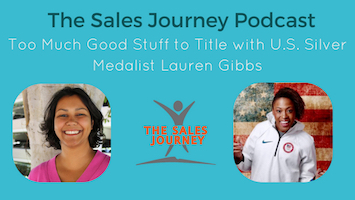Hi, this is Tasha with Emerge Sales Training, and today I have an interview with a fellow Cutco Alumni, Lauren Gibbs, who has gone on to an impressive sales career of her own. But that wasn’t enough for her as you’ll hear her sales journey, including some rough patches. She learned that even though she moved away from sales, the skills and experiences she learned has helped her in her recent accomplishments, which are really cool.
Here are some highlights/paraphrased thoughts from the interview.
~~~~~~~~~~~~~~~~~~~~~~~~~~~~~~~~~~~~~~~~~~~~~~~~~~~~~~~~~~~~~~~~~~~~~~~
Lauren, who went to college at Brown University, played volleyball there, and started selling Cutco while in college, introduces herself and walks Tasha through her transition from college to professional life and some of the unexpected realities she found in a life in sales.
~0:50
Lauren: Your career is really dependent upon the product, support, and resources you have. I thought because I was good at Cutco that I could sell anything, but I learned that hazardous waste disposal services do not sell themselves. So I got fired from that job, sat on my couch for 7 months collecting unemployment feeling like I screwed everything up. Luckily my dad was kind enough to pay for me to go to therapy and work through what I call my rich-kid-syndrome-issues.
Then I found a job with ADT, and found “Holy corporate America!” This is not…everything is beige!…everything joked about in movies is real! And it was just not the right space for my very entrepreneurial spirit. And there is nothing wrong with wearing suits every day, but it did not fit what I now know as my “authentic self.” 🙂
So I decided to go to grad school; it’ll be my hobby. 🙂 Which is not what is a normal hobby, but it’s productive, and in the process I got promoted. But after grad school I had to go back to just living the same life I was living before. At that point I was making six figures, I had the dream apartment, and I had nice things. But that wasn’t “it” for me. I thought to myself, “I can’t believe I work this hard to get this place where I thought I wanted to be, but I can’t do this for the rest of my life.” So I started to wonder “What do I do next?”
~~~~~~~~~~~ 3:20 Lauren starts to talk about how she discovered the women’s bobsled as the event for her to participate in, or, as she puts it, how the bobsled discovered her ~~~~~~~~~~
L: At the time I was 30 and a friend of mine started asking me all kinds of questions about how much I could squat, deadlift, and if I could sprint. I was like, “Hey! What’s up with the athletic interview?” And she said, “I think you should bobsled,” and I said, “People don’t do that. Bobsled isn’t a thing.” I also came up with all kinds of excuses like my job, I just finished grad school, I have been sitting at a desk for 10 years, I can’t bobsled.
But during that time while I was unemployed I made a deal with myself that I would see through and fully vet any opportunity that came to me before turning it down, because during that time I was turning down a lot of jobs I thought I was too good for. But because I was doing that I was sitting on my butt doing nothing.
So I had to at least try because I didn’t want to be a hypocrite. The tryout was at an Olympic training center, and I had never been to one before, so why not? I figured I’d go, run into Michael Phelps, buy a cool t-shirt, eat in the cafeteria, and that would be the cool story I tell at work on Monday. Unfortunately, I didn’t run into Michael Phelps, but two weeks later I got an email to be invited to a camp in Lake Placid, NY for a week. I didn’t know much about that, but I knew THAT would be a cool story to tell! A free week at an Olympic training center?! That’s awesome!
At that point I had transitioned out of the corporate job and started working with Mark Lovas (former Cutco Regional manager) at Trumaker and told him I was going to be gone for a week, but, don’t worry, I’m not actually going to bobsled. He just paused, and stared at me the way he does when he’s processing information, then just went on with whatever we were talking about.
Then it just, pun intended, snowballed after that. The camp went well, then I got invited to this, and I got invited to that, and the next thing I know I’m standing on top of a mountain clicking on a bobsled helmet. From that longest minute of my life from that first run, I was hooked. And four years later I’m an Olympic Silver Medalist.
Tasha: Yeah…well done. Well done.
L: Thank you.
~~~~~~~~~~~~~~~~~~~~~~~~~~~~~~~~~~~~~~~~~~~~~~~~~~~~~~~~~~~~~~~~~~~~~~~~
~6:15
T: So how did your sales experience factor into who you are today?
L: It’s funny because I remember so fondly on my sales experience, especially at Cutco, as a sales rep, going to bed really late because I was an 18 year old, partying with my friends-whatever that meant as an 18 year old in Pasadena-then get up at 6:30, put on a suit, drive from Pasadena to Hollywood not knowing there was an office closer, fighting traffic, making my phone calls, driving back to Pasadena for my appointments, and then driving back to Hollywood at night to make more phone calls. I remember thinking at the time, “Gosh this is so hard! Why is this so hard?”
But I am a firm believer that on the day of victory no fatigue is felt. So that mentality has carried me through any tough situation. Any real opportunity is not going to be easy. That’s something sales teaches you: sometimes people cancel orders, that’s just part of life. Sometimes customers are not happy with you, that’s just part of life….Sales teaches you about life. It teaches you to work really hard, and that you are the master of your success. And it also teaches you that things happen, and you move on and get over it.
~~~~~~~~~~~~~~~~~~~~~~~~~~~~~~~~~~~~~~~~~~~~~~~~~~~~~~~~~~~~~~~~~~~~
~8:30
Tasha asks Lauren how she transitioned from corporate America to being a member of the Olympic bobsled team, since many network marketers are re-careering and don’t have sales experience but are determined to build a sales empire. She asks Lauren for her advice.
L: In some instances I would say go at it with reckless abandon. You have to throw yourself into it and be overcommitted.
The other important part is to seek out other people who have done what you’ve done.
Be open to learning, and be open to failure.
~~~~~~~~~~~~~~~~~~~~~~~~~~~~~~~~~~~~~~~~~~~~~~~~~~~~~~~~~~~~~~~~~~~
~10
T: Tell me about how you had to learn how to sprint.
L: That’s still in the process, but it’s gotten better. I didn’t realize how much technique is involved. You would think running in a straight line would be easy, but it is harder than you think. I was lucky come in two years before Rio happened, because I got to be in a training facility with a lot of summer athletes.
It showed me that you really need to refine the things you are not good at to get to where you need to be. You can’t shy away from the things that are difficult because that will never push you in the right direction. That is what sprinting was for me.
~12 – 14:30
Tasha asks Lauren to talk about “being comfortable in your own skin.” Lauren attributes her experience in sport and in sales to taught her “that your body is used for more than just looking good, and, sales teaches you that, if you work hard, there is no one that can hold you back. There is no glass ceiling to commission-only sales. The only person who is going to keep me from hitting my numbers is me.”
~~~~~~~~~~~~~~~~~~~~~~~~~~~~~~~~~~~~~~~~~~~~~~~~~~~~~~~~~~~~~~~~~~~~~~
~14:50
T: Now, a lot of our students need to recruit for their team. Your pilot, Elana, is…is “it” when it comes to the bobsled, and I would argue that you had to recruit Elana in some way.
L: Yeah! Oh yeah! I had to sell her on me for sure!!
T: So how do you recruit out of your league?
L: I threw myself on the sword and told her, “Look, I want to be the person who wins a Gold Medal with you, so you tell me what I need to do and be to be that person in your sled.” Early on I got hurt, and when you’re starting out in bobsled the repetitions early are are so important. I would liken it to making phone calls in sales – you’ve got to put more into it to prime the pump. And, as I’m saying this, you know what talk I’m thinking of?
T: Dave Madrid (Cutco division manager) priming the pump!
L: Yes, sweating on stage!
So I recovered, but our push wasn’t great in that time trial, so all the rest of that season I was out of her sled. Just like that I was U.S.A. 1, and just like that I wasn’t. So I felt like I never got a fair shot, so it was basically four years of me trying to close the deal. And it wasn’t until just a couple of months before PyeongChang where I told her, “Look, I’m your girl!” 🙂
It is just like sales: it was listening to what she wanted and coming back with solutions that made me the right choice.
T: Right that sounds perfect…and being persistent.
L: Right, absolutely.
~~~~~~~~~~~~~~~~~~~~~~~~~~~~~~~~~~~~~~~~~~~~~~~~~~~~~~~~~~~~~~~~~~~~~~~~
Tasha and Lauren close out the interview discussing perspectives on winning and advice on comparing your position to others.
Please check out the entire interview at the link below from our YouTube channel. If you would like to follow Lauren on social media, her Instagram is @lagibbs84.
If you feel like you’re ready to develop the skills you need to grow your business, then you’re ready to sign up for Emerge’s sales foundation course at http://bit.ly/2Hp2Wl7.
Have a great day!

